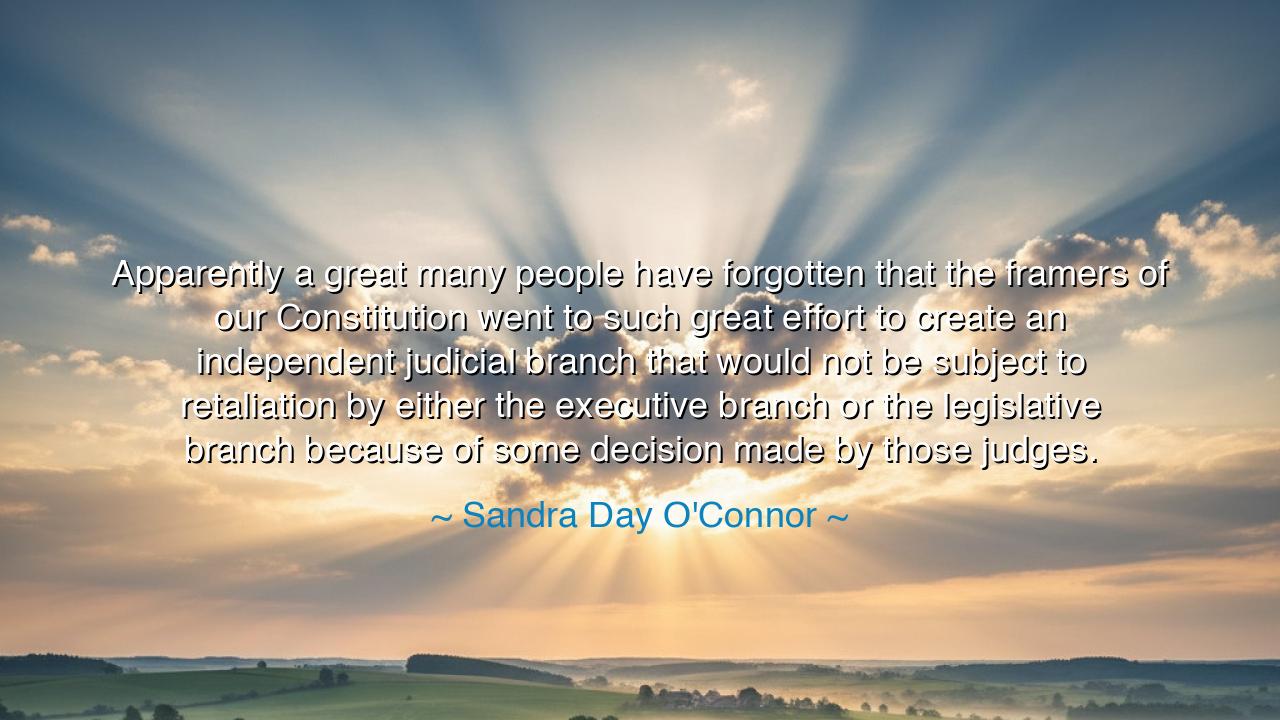
Apparently a great many people have forgotten that the framers of
Apparently a great many people have forgotten that the framers of our Constitution went to such great effort to create an independent judicial branch that would not be subject to retaliation by either the executive branch or the legislative branch because of some decision made by those judges.






“Apparently a great many people have forgotten that the framers of our Constitution went to such great effort to create an independent judicial branch that would not be subject to retaliation by either the executive branch or the legislative branch because of some decision made by those judges.” — Sandra Day O’Connor
In these solemn and stirring words, Justice Sandra Day O’Connor, the first woman to serve on the United States Supreme Court, raises her voice as both guardian and teacher of the Republic. Her statement is not merely a legal observation—it is a lamentation for the forgotten wisdom of the founders, and a warning to all who would neglect the delicate balance upon which freedom stands. When she speaks of “the great effort” made by the framers of our Constitution, she reminds us that the preservation of liberty is not a natural inheritance, but a fragile creation wrought through sacrifice, foresight, and faith in justice itself.
The origin of this quote lies in O’Connor’s long and principled defense of judicial independence, a cornerstone of democracy that she saw endangered by the growing tide of political pressure and public misunderstanding. She had witnessed attempts—both subtle and overt—to undermine the courts when their rulings displeased those in power. In her view, this was not simply an affront to judges, but a threat to the rule of law itself. For the founders, as she reminds us, crafted the judiciary as a shield for the people, ensuring that justice would not bend to the passions of the moment or the will of the majority. Their intention was clear: the courts must be free from retaliation, or the law itself would lose its integrity.
To understand her meaning, one must return to the birth of the American Republic. After the long night of monarchy and tyranny, the framers—Madison, Hamilton, and their fellow architects of liberty—feared above all the concentration of power. They designed a system where each branch would check and balance the others, and where the judiciary, though unelected, would stand as the final guardian of the Constitution. In The Federalist Papers, Hamilton called the judiciary the “least dangerous branch,” precisely because it relied not on force or wealth, but on judgment. Yet its strength, he knew, depended on its independence. If judges could be punished or coerced by those they judged, then justice would become a servant of power, and tyranny would wear the mask of law.
Throughout history, the peril of a compromised judiciary has revealed itself with devastating clarity. In the 1930s, during one of the darkest chapters of modern civilization, the courts of Nazi Germany became tools of the regime. Once-independent judges bowed to the will of Adolf Hitler, interpreting law to serve oppression rather than justice. They no longer defended the innocent—they legitimized the crimes of the state. This is the fate that O’Connor warns against: when the independence of the judiciary falls, so too does the soul of a nation. Her words echo the ancient wisdom of every civilization that has learned—often too late—that law without freedom is tyranny, and freedom without law is chaos.
Justice O’Connor’s concern was not theoretical. She saw in her own lifetime the creeping erosion of public respect for the courts—the rise of political retaliation against judges whose rulings were unpopular. Whether through legislative threats, campaigns to unseat judges, or public vilification, she recognized a dangerous impatience in the body politic: the desire to punish rather than to understand, to conquer rather than to deliberate. Yet she reminds us that the strength of democracy lies not in the victory of factions, but in the restraint of power—a restraint made possible only when judges are free to speak the truth of the law, unafraid of reprisal.
Her warning also carries a profound moral resonance. Justice, in its truest form, demands courage—the courage to decide according to principle rather than popularity, to uphold what is right even when the crowd cries otherwise. The independent judge is like the lone voice of the philosopher or prophet, standing firm against the winds of anger and ambition. Such independence is not arrogance; it is devotion. It is the willingness to uphold the Constitution not as an artifact of history, but as a living covenant between liberty and conscience.
The lesson of O’Connor’s words, then, is both civic and personal. As citizens, we must defend the independence of the courts as fiercely as we defend our own freedoms, for they are one and the same. We must remember that justice thrives not when the powerful triumph, but when the law remains steadfast even against them. In our daily lives, too, we can learn from this principle: to act not from fear of retaliation, but from fidelity to truth; to hold our convictions not as weapons of division, but as instruments of fairness.
So, O listener, take this wisdom as both heritage and warning: the independence of justice is the breath of liberty. Guard it with vigilance. Respect it even when it challenges your will. For as Sandra Day O’Connor reminds us, the framers labored not to build a government of rulers, but a nation of laws—a sanctuary where right may stand above might, and where the quiet voice of reason, protected from vengeance, speaks forever in the name of freedom.






AAdministratorAdministrator
Welcome, honored guests. Please leave a comment, we will respond soon